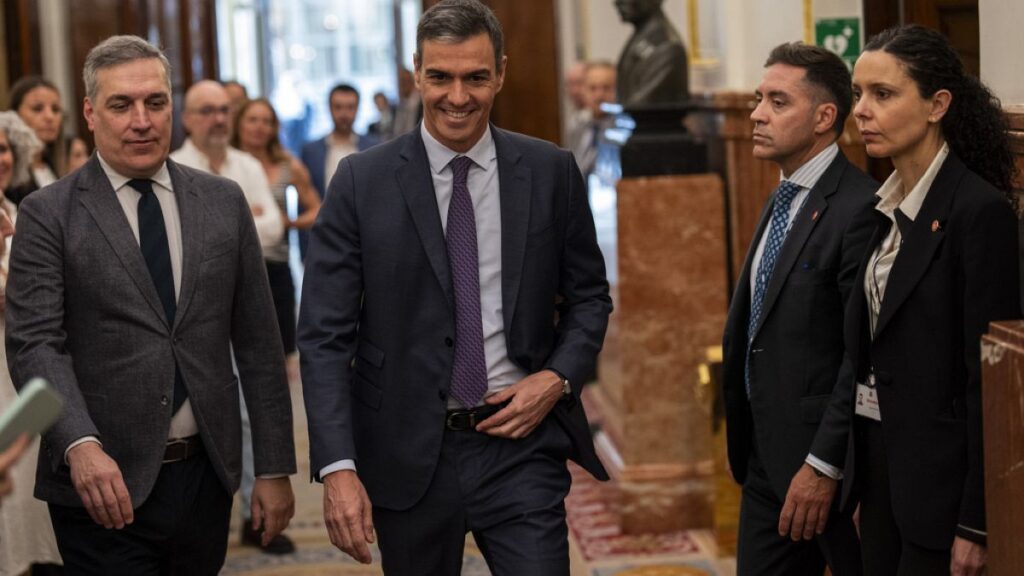After six months of tough negotiations and strong criticism from the oppositionTHE Congress has approved the amnesty law on Thursday by a narrow margin: 177 votes for and 172 against.
The law amnesties more than 300 people accused in the “trials”, including the former president of the Generalitat, Carles Puigdemont, who is on the run. Politically, analysts interpret this decision as a new victory for the socialists.
“The government managed to equalize the match at the last minute,” summarized political consultant Jordi Sarrión in statements to Euronews. Mr. Sarrión believes that Spain is entering “a new phase of dialogue with the Catalonia“.
What is amnesty?
Amnesty is a legal tool that prevents criminal prosecution against the accused. On certain occasions, like this one, States resort to it to resolve certain conflicts.
“The effect it has is that when someone commits a crime, their criminal liability disappears“, explains to Euronews the lawyer and parliamentary journalist Antonio Gómez de Olea, who was present at the Congress of Deputies THURSDAY.
Mr. Gómez de Olea assures that the law is limitedthat is, it only affects crimes committed on the specific date included in the legal text (the period of the Catalan “trial”).
What is the difference between amnesty and pardon?
So that everyone understands clearly, the lawyer explains that forgiveness consists of “forget criminal acts without forgiving them”. Amnesty, on the other hand, is “total forgiveness of crimes“, which means in a way that the State recognizes that it acted wrongly in drawing up certain laws or, on the contrary, that justice should not have prosecuted the convicted people.
“Amnesty, in short, consists of forgive certain crimes so that those who committed them cannot be prosecuted”, insists the parliamentary columnist, who is also interested in the crime of terrorism.
The crime of terrorism, the keystone
After’approval of the amnesty law, it is now up to judges to interpret and apply it. There the most sensitive issue concerns terrorism offenses blamed on those responsible for “Tsunami Democràtic”, the independence organization which coordinated the October 1 demonstrations2017.
For the violent acts that took place during the demonstrations, the Supreme Court opened a criminal proceedings for terrorism against Carles Puigdemont and MP Jorge Wagensberg as instigators of the protests.
The judges must now determine whether what he did “Democratic tsunami“is terrorism”, asks Antonio Gómez de Olea. If they consider it to be a terrorist crime, Carles Puigdemont will not escape conviction for this crime, which cannot be amnestied .
What will happen now with Carles Puigdemont?
The future of Puigdemont depends on his return to Spain. At that point, explains Mr. Gómez de Olea, “he will have to go to court or he will be arrested. In this court there will be a hearing during which he will be released freely under the amnesty.”
Does the amnesty law violate Community law?
The amnesty has already been approved, but the Spanish justice is subject to community law as a member of the European Union. This means that once the amnesty law is published in the Official State Gazette, judges could send the case back to Luxembourg .
In the event that judges appeal to European justice, it would have to determine whether or not the law is in conflict with the EU standards. In this case, “the law should be reformulated”.
“The most likely scenario is that there is no conflict with European law“, says the parliamentary columnist. But many also wonder about the impact of this measure on the European elections.
Will the amnesty have an impact on the European elections?
Political analysts like Jordi Sarrión do not think it will affect the PSOE “in view of the latest polls, especially in a context where theEurope leans very right, but where Spain is not so right-wing as that.”
“In the long term, if Junts thus renounces the unilateral path to independencethis would open the door to possible pacts between this independence group and the Popular Party, which would change the political panorama,” believes Mr. Sarrión.
For now, the amnesty law still needs to be approved by Felipe VI and published in the Official State Gazette.

